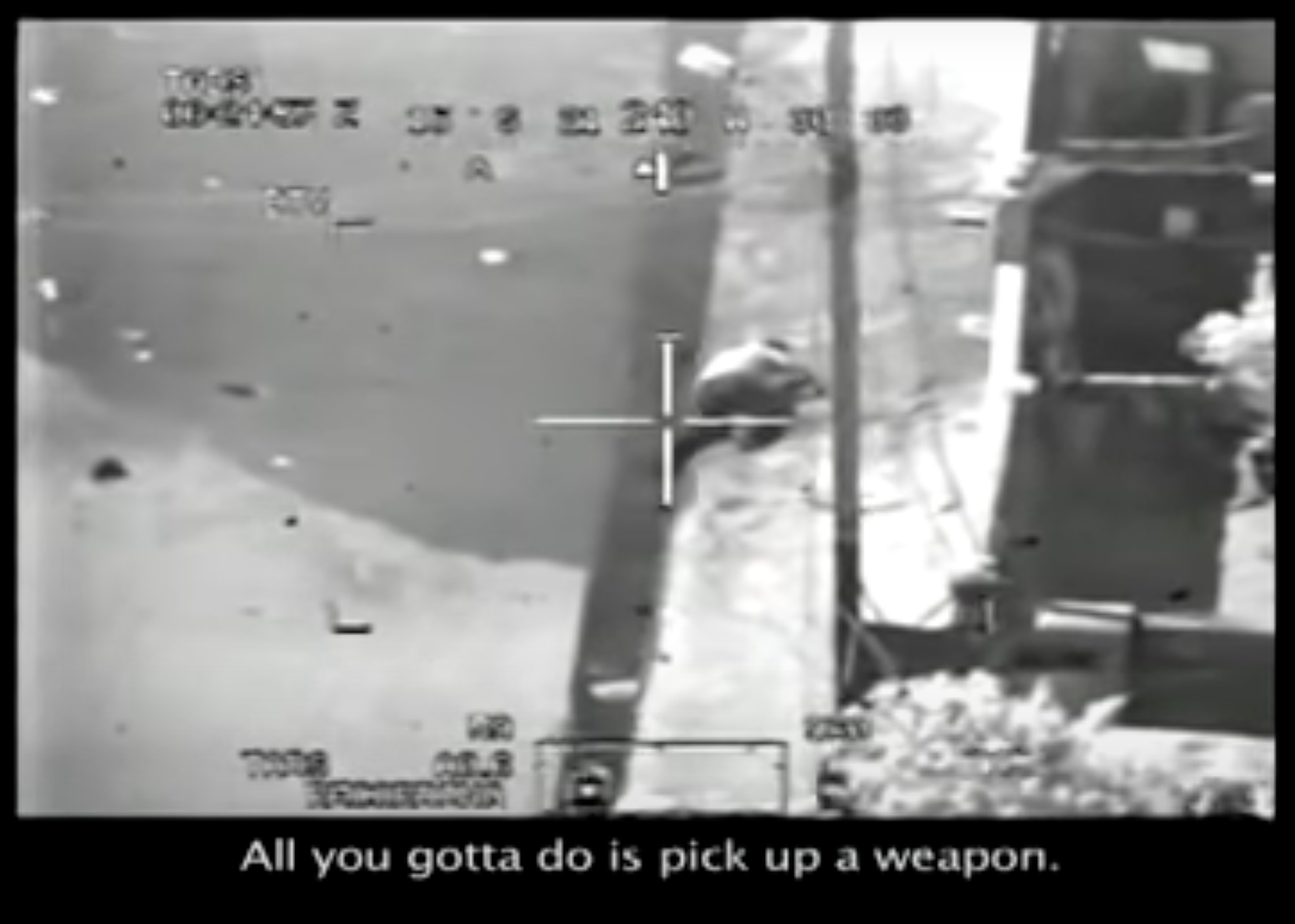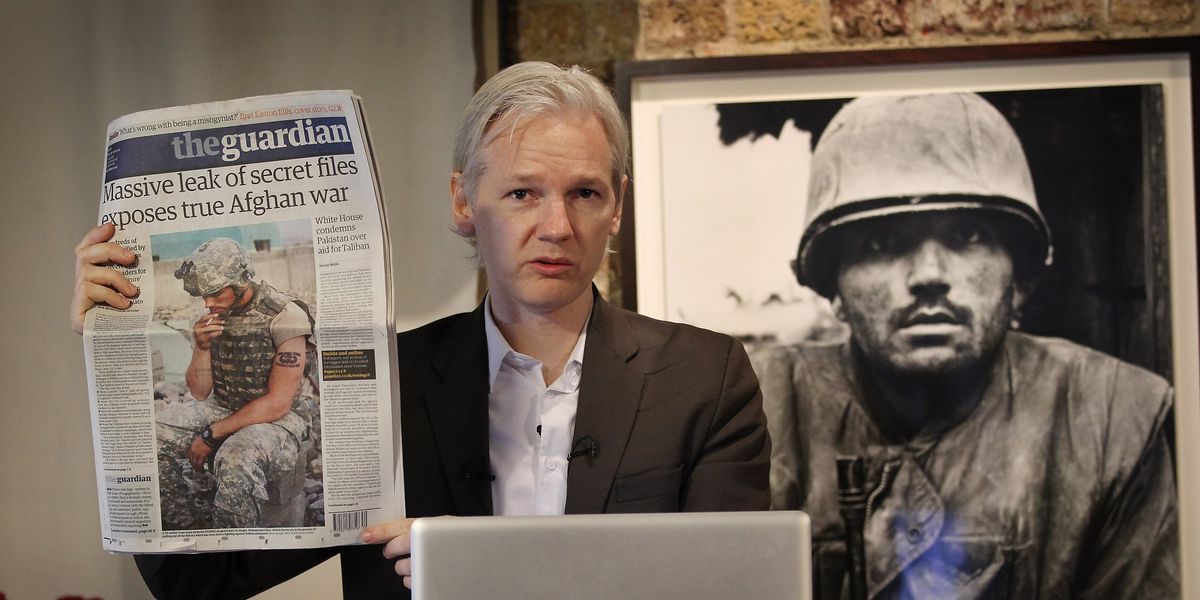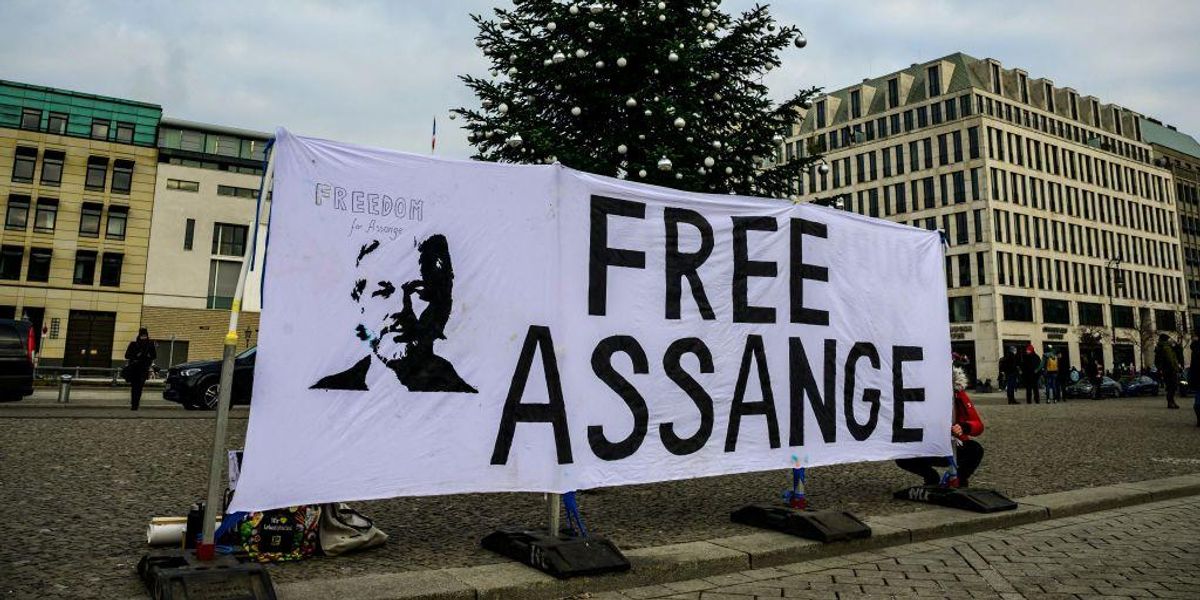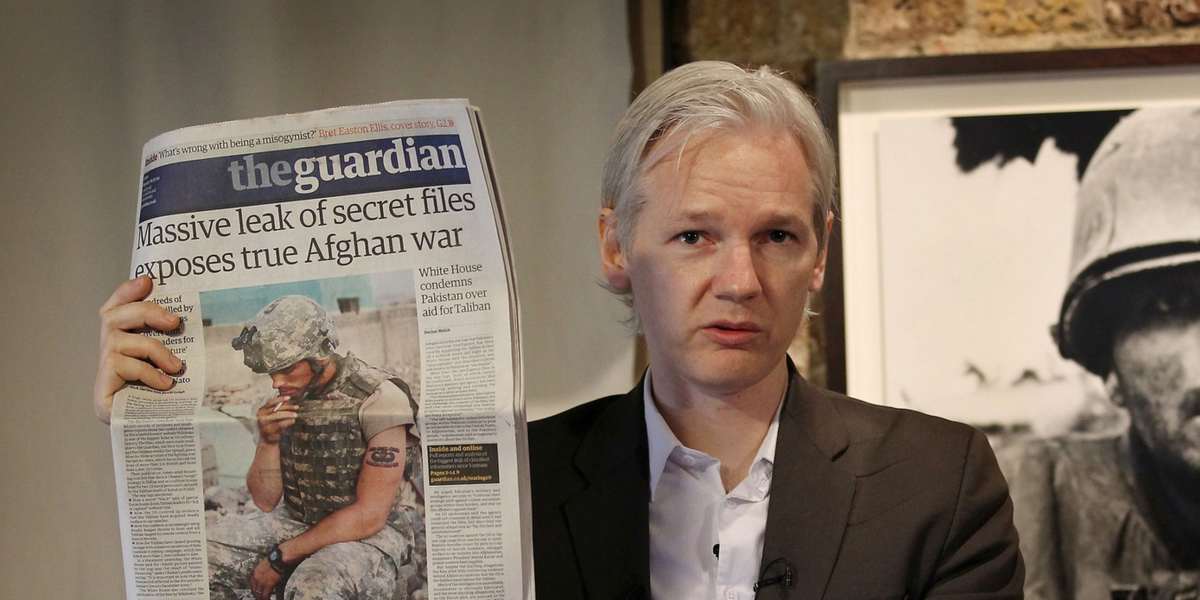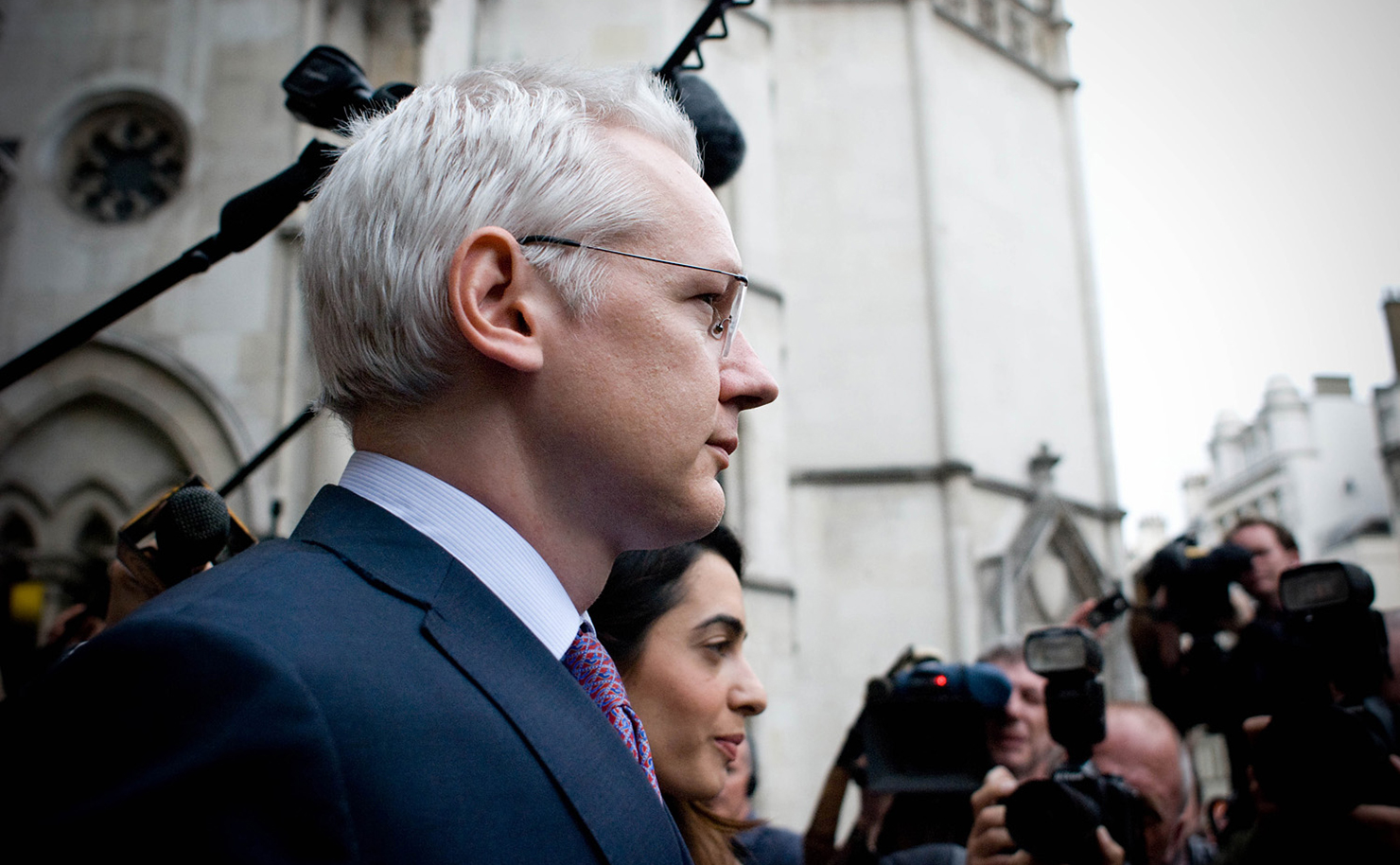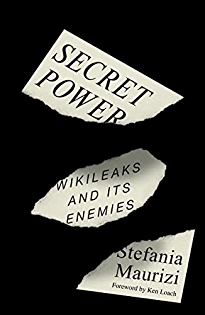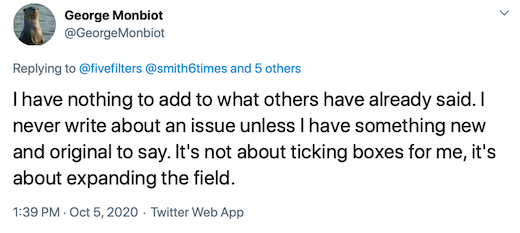Adapted from Guilty of Journalism: The Political Case against Julian Assange
 Private First Class Chelsea Manning received the harshest punishment any United States military officer or federal government employee has ever received for leaking classified information to the press. Colonel Denise Lind, the military judge presiding over her court-martial, sentenced Manning to thirty-five years at Fort Leavenworth prison in Kansas.
Private First Class Chelsea Manning received the harshest punishment any United States military officer or federal government employee has ever received for leaking classified information to the press. Colonel Denise Lind, the military judge presiding over her court-martial, sentenced Manning to thirty-five years at Fort Leavenworth prison in Kansas.
She was found guilty of six charges under the Espionage Act, five stealing charges, one charge involving the “wanton publication” of “intelligence,” multiple charges of “failure to obey an order or regulation,” and one charge under the Computer Fraud and Abuse Act. Notably, Manning was acquitted of an “aiding the enemy” offense that carried a potential sentence of life in prison.
Manning was never charged with any conspiracy offenses, and, unlike the charges against Assange, military prosecutors did not accuse her of attempting to crack a password hash. Even with logs from alleged chats between Manning and Assange, there was scant evidence that Assange or any WikiLeaks staff attempted to enlist her to leak. Prosecutors only expressed disgust that she had independently chosen to become a source and shared more than 700,000 documents.
When Manning’s trial occurred in 2013, WikiLeaks was not yet designated a “hostile intelligence agency” by the CIA. However, by 2019, there was no longer division in the government over whether to treat WikiLeaks as a journalistic entity or not. The indictment plainly claimed, “To obtain information to release on the WikiLeaks website, Assange recruited sources and predicated the success of WikiLeaks in part upon the recruitment of sources” in order to “illegally circumvent legal safeguards on information.”
Prosecutors at the Justice Department (DOJ) would like the public to believe that Assange posted a “Most Wanted Leaks” list to the WikiLeaks website in 2009 to solicit leaks from “insiders” like Manning, and Manning used it to determine which documents to provide to WikiLeaks.3
Yet, this conspiracy theory, which forms the basis of criminal allegations against Assange, was promoted by military prosecutors during Manning’s trial, and it was discredited by Manning’s own statement to the court and David Coombs, her defense attorney.
Despite Manning’s statement, DOJ prosecutors concocted their own conspiracy theory to further their political case. Central to this theory is the “Most Wanted Leaks” list.
On May 14, 2009, WikiLeaks requested nominations from human rights groups, lawyers, historians, journalists, and activists for documents as well as databases from around the world that the media organization would work to expose.
The list, according to prosecutors, was “organized by country and stated that documents or materials nominated to the list must ‘be likely to have political, diplomatic, ethical, or historical impact on release.’” WikiLeaks suggested the information should be “plausibly obtainable to a well-motivated insider or outsider.”
With little to no evidence, military prosecutors called the list Manning’s “guiding light,” a characterization Manning’s defense attorney David Coombs directly challenged during his closing argument.
“It was WikiLeaks saying, look, tell us, humanitarians, activists, NGOs, fellow reporters, what do you want to know in your country? What in your country is being hidden from the public that you believe the public should know? Give us a list,” Coombs said.
“We are going to compile that list, and we are going to work to obtain that list. What does this sound like? Any journalistic organization that has like a hotline or anything else says, call us. You got a story. Call us. We’ll investigate.”
There were seventy-eight items on the list. As Coombs noted, military prosecutors were only able to “remotely” tie Manning to “four of the things on the list.” She could have used Intelink, which is a US intelligence network of top secret, secret, and unclassified databases, to search for specific items on the list. She did not.
DOJ prosecutors emphasized in their indictment that the list requested “bulk databases,” including Intellipedia, a classified Wikipedia for US intelligence analysts. Yet Manning never released this database to WikiLeaks, nor did she release the complete CIA Open Source Center database or PACER database containing US federal court records, which were listed as “important bulk databases.”
Chat logs show Manning brought up the CIA Open Source Center on March 8, 2010, and a user, whom the government claims was Assange, replied, “That’s something we want to mine entirely.” But Manning never engaged in any attempts to download and transfer this database to WikiLeaks.
Manning released four sets that could be labeled “bulk databases.” She released the Afghanistan and Iraq War Logs, the US State embassy cables in the Net-Centric Diplomacy database, and the database containing detainee assessments from Joint Task Force Guanta?namo. None of those documents were on the “Most Wanted Leaks” list.
DOJ prosecutors contended Manning’s searches on November 28, 2009, for “retention+of+interrogation+videos” and “detainee+abuse” matched up with the “Most Wanted Leaks” list. However, at the time, WikiLeaks was interested in obtaining copies of any of the ninety-two CIA torture tapes that were destroyed as well as “detainee abuse photos withheld by the Obama administration.” It is far more plausible that Manning searched for abuse photos or torture videos.
Contrary to Manning’s version of events, DOJ prosecutors insisted that Assange convinced Manning to find the detainee assessment briefs and release them. FBI special agent Megan Brown, of the “counterespionage squad” at the Washington Field Office in the District of Columbia, wrote, “Manning asked Assange, ‘how valuable are JTF GTMO detention memos containing summaries, background info, capture info, etc?’ Assange replied, ‘Time period?’ Manning answered, ‘2007–2008.’”
Assange allegedly responded, “Quite valuable to the lawyers of these guys who are trying to get them out, where those memos suggest their innocence/bad procedure,” and added, “also valuable to merge into the general history. Politically, Gitmo is mostly over though.”
Yet in the messages Brown referenced, Assange never specifically asked Manning to provide the reports to WikiLeaks. He did not say whether WikiLeaks would publish the documents. He certainly did not solicit Manning to leak the detainee assessments. All Assange allegedly did was state his opinion that the documents were in the public interest.
Prosecutors attempted to link Manning’s disclosure of rules of engagement for US military forces in Iraq to the supposed “Most Wanted Leaks” list because it included “Iraq and Afghanistan U.S. Army Rules of Engagement 2007–2009.” They suggested Manning provided the files to WikiLeaks on March 22, 2010, after Assange allegedly wrote on March 8, “Curious eyes never run dry.”
Manning said she uploaded the rules of engagement with the “Collateral Murder” video on February 21, weeks before the alleged exchange with Assange.
One lesser-known Espionage Act charge against Manning involved the alleged disclosure of video showing the Garani massacre by US military forces in the Farah province of Afghanistan. An air strike killed at least eighty-six Afghan civilians on May 4, 2009. She was acquitted, a fact that poses a problem for the DOJ’s theory.
According to evidence presented during the trial, Jason Katz, an employee at Brookhaven National Laboratory from February 2009 to March 2010, tried to help WikiLeaks and downloaded an encrypted file with the air strike video onto his work computer on December 15. Katz was unable to use a password-cracking tool to open the file.
WikiLeaks indicated on Twitter on January 8, “We need supercomputer time.” The media organization apparently had an encrypted file of the attack, but they were never able to decrypt the file.
Military prosecutors attempted to connect Manning to Katz. They claimed during their case that Manning’s earliest violations began on November 1, and Manning had provided the video to Katz to decrypt with a supercomputer. Although Manning searched and downloaded “Farah” files, the video Katz had did not match any of Manning’s files.
“Let’s go along with the government and its logic. Pfc. Manning hits the ground in Iraq in mid-November,” Coombs argued. “For whatever reason, [her] motive, I’m now going to use the 2009 ‘Most Wanted [Leaks]’ List as my guiding light. And I’m going to give something to WikiLeaks. I’m going to do it because I’m now a traitor. I’m now an activist.
“So what is the first thing I’m going to choose? What is the very first thing I’m going to give to WikiLeaks and say look, WikiLeaks, I’m for you? Well, I’m going to give you an encrypted video I can’t see. You can’t see. Guess what? We don’t have a password for it. By the way, you never asked for it. That’s not on your 2009 ‘Most Wanted [Leaks]’ list.”
Coombs suggested, “This is kind of like someone showing up to a wedding and giving you something that’s not on the list that you registered for. What do you think Pfc. Manning is doing at this point? According to the government, [she] is like, hey, you know what, I can go to the seventy-eight things that you want, but I don’t want to give you that stuff.”
Military prosecutors seem to have failed to persuade the military judge that Manning used the “Most Wanted Leaks” list as her guide. Lind’s “special findings” show she accepted evidence that Manning viewed a tweet from WikiLeaks on May 7, 2010, which requested a list of as many military email addresses as possible. This led Manning to compile a list of over 74,000 addresses for WikiLeaks. Except Lind did not find that WikiLeaks had solicited Manning to leak any of the more than 700,000 documents that were published.
When the first indictment against Assange was disclosed by the Justice Department on April 11, 2019, the response from some attorneys and advocates was mixed. It was widely viewed as “narrowly tailored” to avoid “broader legal and policy implications.”
The DOJ did not accuse Assange of hacking into a US military computer. He was accused of “conspiracy to commit computer intrusion” when he allegedly “agreed” to assist Manning in “cracking a password hash” to help her browse information databases anonymously.
DOJ prosecutors were already presented with evidence related to these allegations during Manning’s trial. Patrick Eller, a command digital forensic examiner responsible for a team of more than eighty examiners at US Army Criminal Investigation Command headquarters, reviewed court-martial records for Assange’s defense. He testified during the evidentiary hearing in the extradition case in September 2020.
Eller found testimony from the US military’s own forensic expert that contradicted presumptions at the core of the computer crime charge. Password hashes are generally used to help authenticate users and passwords on a computer. Manning never provided the two files necessary to “reconstruct the decryption key” for the password hash. According to Eller, at the time it was not “possible to crack an encrypted password hash, such as the one Manning obtained.”
James Lewis QC, a prosecutor for the Crown Prosecution Service, asked Eller if he agreed that Manning and Assange “thought they could crack a password and agreed to attempt to crack a password.” Eller told Lewis a hash was provided and that the account user that the US government associated with Assange said they had “rainbow tables for it.” (Using “rainbow tables” is one decryption method for cracking the hash by guessing different password values.) However, Manning never shared where she obtained the hash.
“The government’s own expert witness in the court-martial stated that was not enough for them to actually [crack the password],” Eller added. A user must also have a system file to complete an attempt at password-cracking. During the Manning trial, David Shaver, a special agent for the Army Computer Crimes Investigating Unit, testified that the “hash value” was included in the chat, but it was not the “full hash value.”
Major Thomas Hurley, who was on Manning’s defense team, asked if Manning would have needed more of the hash value to crack the password. Shaver replied, “I mentioned the system file, you would need that part as well.” (This was one of the two files Eller said were necessary for decryption.)
“So the hash value included in the chat wouldn’t be enough to actually gain any passwords or user information?” Hurley asked.
Shaver replied, “Correct.”
Eller’s statement submitted to the Westminster Magistrates’ Court in London was even more explicit.
Upon reading the indictment, it became clear that the technical explanation of the password hashing allegations is deficient in a number of ways which cast doubt upon the assertion that the purpose of the Jabber chat was for Manning to be able to download documents anonymously.
Jabber is the software Manning used to chat with the account allegedly associated with Assange.
Manning had already downloaded the Reykjavi?k cable, Guanta?namo Files, Iraq War Logs, and Afghanistan War Logs before the alleged exchange on password-cracking occurred. “Routinely in the course of work,” according to Eller, she downloaded military incident reports to have “offline backups” in the event of “connectivity issues” with the Secret Internet Protocol Router Network that hosted the information.
“The only set of documents named in the indictment that Manning sent after the alleged password-cracking attempt were the State Department cables,” he said. However, Eller acknowledged, “Manning had authorized access to these documents.” Eller showed that soldiers at Forward Operating Base Hammer in Iraq, where Manning was stationed, constantly tried to crack administrative passwords to install programs that were not authorized for their computers.
Jason Milliman, a computer engineer contracted to manage laptops at the base, testified during Manning’s court-martial that “soldiers cracked his password in order to install a program and then deleted his administrator account.”
As Eller asserted, Manning never would have tried to use a password hash to exfiltrate files for submission to WikiLeaks because she already had a way to anonymously access the files: a Linux CD that allowed her to bypass Windows security features.
Sgt. David Sadtler, a soldier in Manning’s battalion, testified that Manning proposed starting “some sort of hash cracking business.” The idea had already been done in the “open source world.” So “reimplementing it” made sense to Sadtler.
Eller concluded, “While she was discussing rainbow tables and password hashes in the Jabber chat, she was also discussing the same topics with her colleagues. This, and the other factors previously highlighted, may indicate that the hash cracking topic was unrelated to leaking documents.”
During the court-martial, military prosecutors underscored the fact that Manning exchanged messages with a user identified as “Nathaniel Frank,” a name the government believed was associated with Assange.
Assange attorney Mark Summers QC asked Eller multiple times if he found evidence that linked Assange to this account. “No, I did not,” Eller replied.
Summers asked if Eller was aware of the person who sat at the other end of whatever computer terminal “Nathaniel Frank” used. “Of course not. I could not have that personal knowledge,” Eller added.
Major Ashden Fein, a military prosecutor, said during the closing argument, “[Manning] was a determined soldier with a knowledge, ability, and desire to harm the United States in its war effort. And, Your Honor, [she] was not a whistleblower. [She] was a traitor—a traitor who understood the value of compromised information in the hands of the enemy and took deliberate steps to ensure they, along with the world, received all of it.”
The attacks on Manning’s character were nasty. In addition to questioning her loyalty to the United States, military prosecutors pejoratively labeled Manning an “anarchist” and a “hacker.” But missing from the prosecutors’ narrative of her acts was any explicit claim that she collaborated with WikiLeaks founder Julian Assange or that she engaged in a password-cracking conspiracy.
As Captain Joe Morrow, one of the military prosecutors, declared during her sentencing: “Pfc. Manning is solely responsible for [her] crimes. Pfc. Manning is solely responsible for the impact.”
Manning was not an insider or spy who worked for WikiLeaks to steal US government documents. She had whistleblower motives that inspired her to take action. That is an inconvenient truth for prosecutors, who are compelled to deny her agency to bolster their arguments.
In fact, submitting documents to WikiLeaks was not Manning’s first choice. As she recounted in her 2022 memoir, README.txt, “While I shared WikiLeaks’ stated commitment to transparency, I thought that for my purposes, it was too limited a platform. Most people back then had never heard of it. I worried that information on the site wouldn’t be taken seriously.”
Manning used landlines, mostly at Starbucks, to reach out to “traditional publications.” She contacted the Washington Post in January 2010. During her court-martial she testified that a reporter she spoke to at the Post had not taken her seriously. Next, she called the New York Times. No one responded to the message she left for the Times’ public editor. She considered going to Politico, but weather conditions hampered plans to travel to its offices in Arlington, Virginia.
WikiLeaks, as she put it in her memoir, was “the publication of last resort.”
